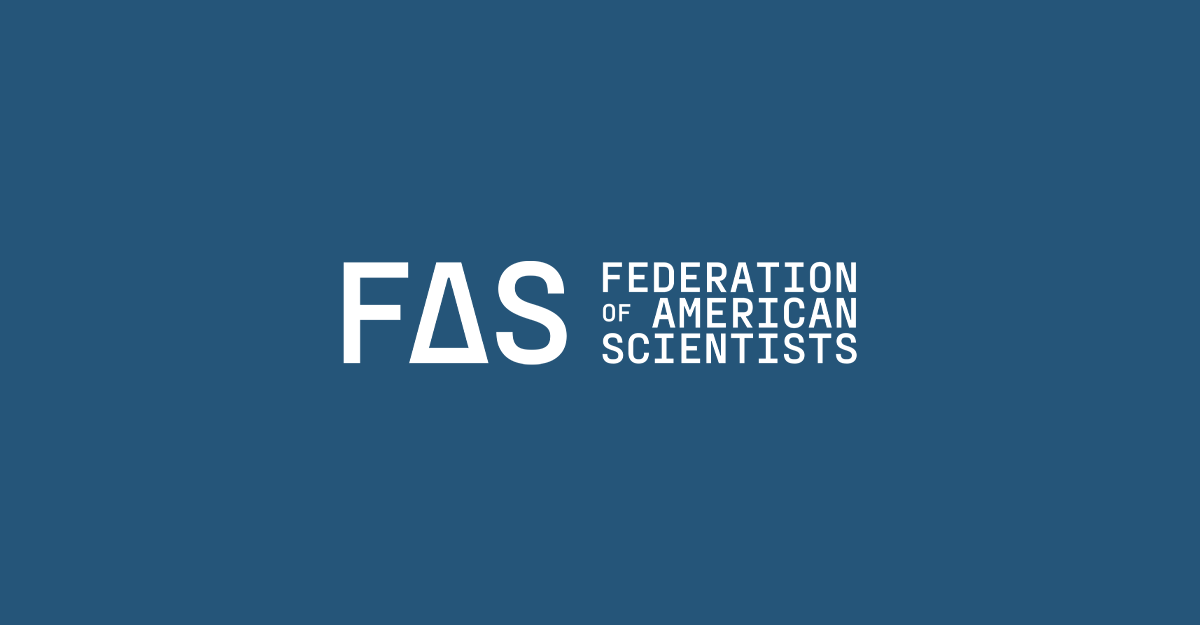
Three Artificial Intelligence Bills Endorsed by Federation of American Scientists Advance from the House Committee
Proposed bills advance research ecosystems, economic development, and education access and move now to the U.S. House of Representatives for a vote
Washington, D.C. – September 12, 2024 – Three proposed artificial intelligence bills endorsed by the Federation of American Scientists (FAS), a nonpartisan science think tank, advance forward from a House Science, Space, and Technology Committee markup held on September 11th, 2024. These bills received bipartisan support and will now be reported to the full chamber. The three bills are: H.R. 9403, the Expanding AI Voices Act, co-sponsored by Rep. Vince Fong (CA-20) and Rep. Andrea Salinas (OR-06); H.R. 9197, the Small Business AI Act, co-sponsored by Rep. Mike Collins (GA-10) and Rep. Haley Stevens (MI-11), and H.R. 9403, the Expand AI Act, co-sponsored by Rep. Valerie Foushee (NC-04) and Rep. Frank Lucas (OK-03).
“FAS endorsed these bills based on the evaluation of their strengths. Among these are the development of infrastructure to develop AI safely and responsibly; the deployment of resources to ensure development benefits more equitably across our economy; and investment in the talent pool necessary for this consequential, emerging technology,” says Dan Correa, CEO of FAS.
“These three bills pave a vision for the equitable and safe use of AI in the U.S. Both the Expanding AI Voices Act and the NSF AI Education Act will create opportunities for underrepresented voices to have a say in how AI is developed and deployed. Additionally, the Small Business AI Act will ensure that an important sector of our society feels empowered to use AI safely and securely,” says Clara Langevin, FAS AI Policy Specialist.
Expanding AI Voices Act
The Expanding AI Voices Act will support a broad and diverse interdisciplinary research community for the advancement of artificial intelligence and AI-powered innovation through partnerships and capacity building at certain institutions of higher education to expand AI capacity in populations historically underrepresented in STEM.
Specifically, the Expanding AI Voices Act of 2024 will:
- Codify and expand the ExpandAI program at the National Science Foundation (NSF), which supports artificial intelligence (AI) capacity-building projects for eligible entities including Minority Serving Institutions (MSIs), Historically Black Colleges and Universities (HBCUs), and Tribal Colleges and Universities (TCUs).
- Broaden the ExpandAI program in scope and types of activities it supports to further build and enhance partnerships between eligible entities and awardees of the National AI Research Institutes ecosystem to broaden AI research and development.
- Direct the National Science Foundation to engage in outreach to increase their pool of applications and address common barriers preventing these organizations from submitting an application.
Small Business AI Act
Emerging science is central to new and established small businesses, across industries and around the country. This bill will require the Director of the National Institute of Standards and Technology (NIST) to develop resources for small businesses in utilizing artificial intelligence, and for other purposes.
- This bill amends the NIST Organic Act, as amended by the National AI Initiative Act, and directs NIST, in coordination with the Small Business Administration, to consider the needs of America’s small businesses and develop AI resources for best practices, case studies, benchmarks, methodologies, procedures, and processes for small businesses to understand, apply, and integrate AI systems.
- It will connect Small Businesses with existing Federal educational resources, such as the risk management framework and activities from the national cybersecurity awareness and education program under the Cybersecurity Enhancement Act of 2014.
- This bill aligns with FAS’s mission to broaden AI use and access as a catalyst for economic development.
National Science Foundation Artificial Intelligence Education Act of 2024 (NSF AI Education Act).
The National Artificial Intelligence Initiative Act of 2020 (15 U.S.C. 9451) will bolster educational skills in AI through new learning initiatives and workforce training programs. Specifically, the bill will:
- Allow NSF to award AI scholarships in critical sectors such as education, agriculture and advanced manufacturing.
- Authorize the NSF to conduct outreach and encourage applications from rural institutions, Tribal Colleges and Universities, and institutions located in Established Program to Stimulate Competitive Research (EPSCoR) jurisdictions to promote research competitiveness.
- Award fellowships for teachers, school counselors, and other school professionals for professional development programs, providing skills and training in collaboration with industry partners on the teaching and application of artificial intelligence in K-12 settings
- This bill aligns with FAS’s commitment to STEM education and equity as powerful levers for our nation to compete on the global stage.
###
ABOUT FAS
The Federation of American Scientists (FAS) works to advance progress on a broad suite of contemporary issues where science, technology, and innovation policy can deliver dramatic progress, and seeks to ensure that scientific and technical expertise have a seat at the policymaking table. Established in 1945 by scientists in response to the atomic bomb, FAS continues to work on behalf of a safer, more equitable, and more peaceful world. More information at fas.org.
The Federation of American Scientists supports Congress’ ongoing bipartisan efforts to strengthen U.S. leadership with respect to outer space activities.
By preparing credible, bipartisan options now, before the bill becomes law, we can give the Administration a plan that is ready to implement rather than another study that gathers dust.
Even as companies and countries race to adopt AI, the U.S. lacks the capacity to fully characterize the behavior and risks of AI systems and ensure leadership across the AI stack. This gap has direct consequences for Commerce’s core missions.
As states take up AI regulation, they must prioritize transparency and build technical capacity to ensure effective governance and build public trust.